The end of the era of repair devices. How Apple and Amazon Clean Up Old Electronics Dealers

Six months have passed since the deal between Amazon and Apple took effect. The apple company agreed to independently sell their gadgets in the largest online store. This was a real blow to seemingly unrelated businesses repairing used devices. Two giant tech companies made a deal, and now thousands of small businessmen are suddenly left without a place to work. About what happened to this business now, and how repair shops are now trying to survive in the new digital age - the new material The Verge .
When John Bamsted looked at his page on Amazon.com in early January, his heart sank. For many years, a small business owner from Minneapolis has been engaged in the restoration and sale of old MacBooks. He bought non-working devices, repaired them himself, then exhibited on Amazon. It turned out a good income. But on January 4, John’s business ceased to exist. Under the Amazon contract with Apple, all its products (and products from other vendors) were permanently removed from the platform. Now only large companies could sell the restored Apple devices on Amazon - Apple itself and some providers authorized by it.
Bamsted says:
You went to your page, to the catalog of your current products, and watched them gradually disappear that morning. I had a complete catalog for sale, but in the course of the day it was reduced to a couple of laptops, and then they disappeared.
For small sellers like Bamsted, an apocalypse has happened. Now they could not sell either new or refurbished Apple products on the US main internet site - Amazon Marketplace. This site, with independent vendors working there, has brought Amazon much more revenue in recent years than its own online store sales. Analysts now believe that it is worth $ 250 billion - more than two times more expensive than trading itself Amazon. And now for many honest sellers of electronics, with a mass of positive reviews and an established portfolio, it suddenly turned out to be closed.
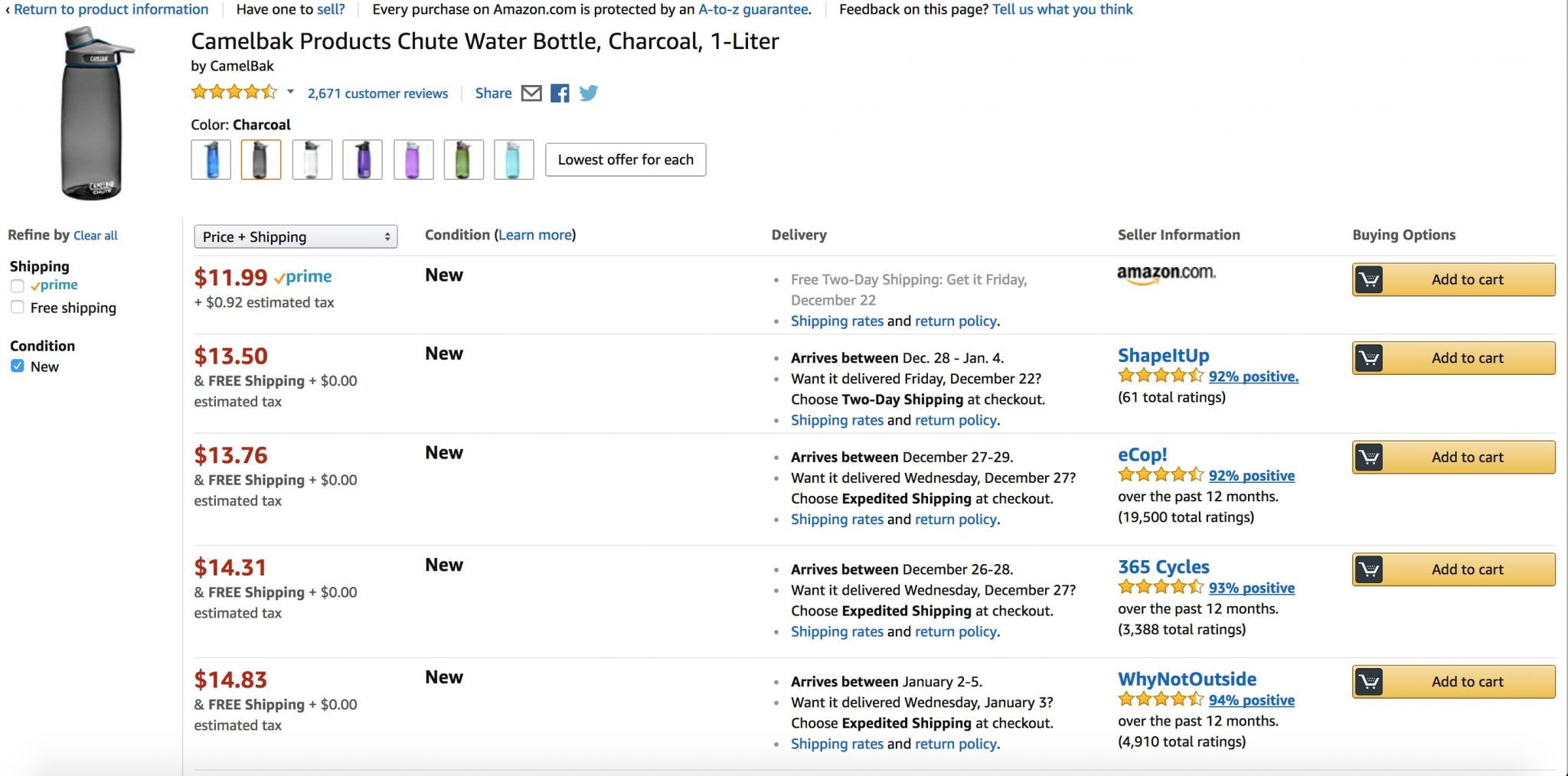
Sales from Amazon and from third-party vendors working on the site
In the US, eBay and Walmart also exist. And a few more specific platforms, like Etsy and Overstock. But none of the alternatives to Amazon offers such a level of logistics and such a fast delivery with all the amenities for sellers. In addition, nowhere and close there are so many buyers.
Companies that want to sell Apple gadgets on Amazon should now meet one of two criteria. Or they buy reconditioned devices for at least $ 2.5 million every 90 days directly from Apple. Or they are registered and become an authorized Apple reseller. What it takes to become such a reseller, the company has not yet informed anyone. But most likely you will at least need to have a physical point of sale where customers could go (this condition Apple puts on all of its repair services). For Amazon private sellers operating at a minimum margin, even such a requirement may prove critical.
The Apple and Amazon deal is estimated to bring hundreds of millions of dollars to both companies. Apple will sell more new devices, and Amazon will get the presence of the most expensive brand on the planet on its platform. Now millions of people will be able to take a new “apple” technique with minimal delivery times, from the place where they are already used to buying goods, and often at prices even lower than on Apple.com. Both companies using Amazon’s improved logistics will get good money.
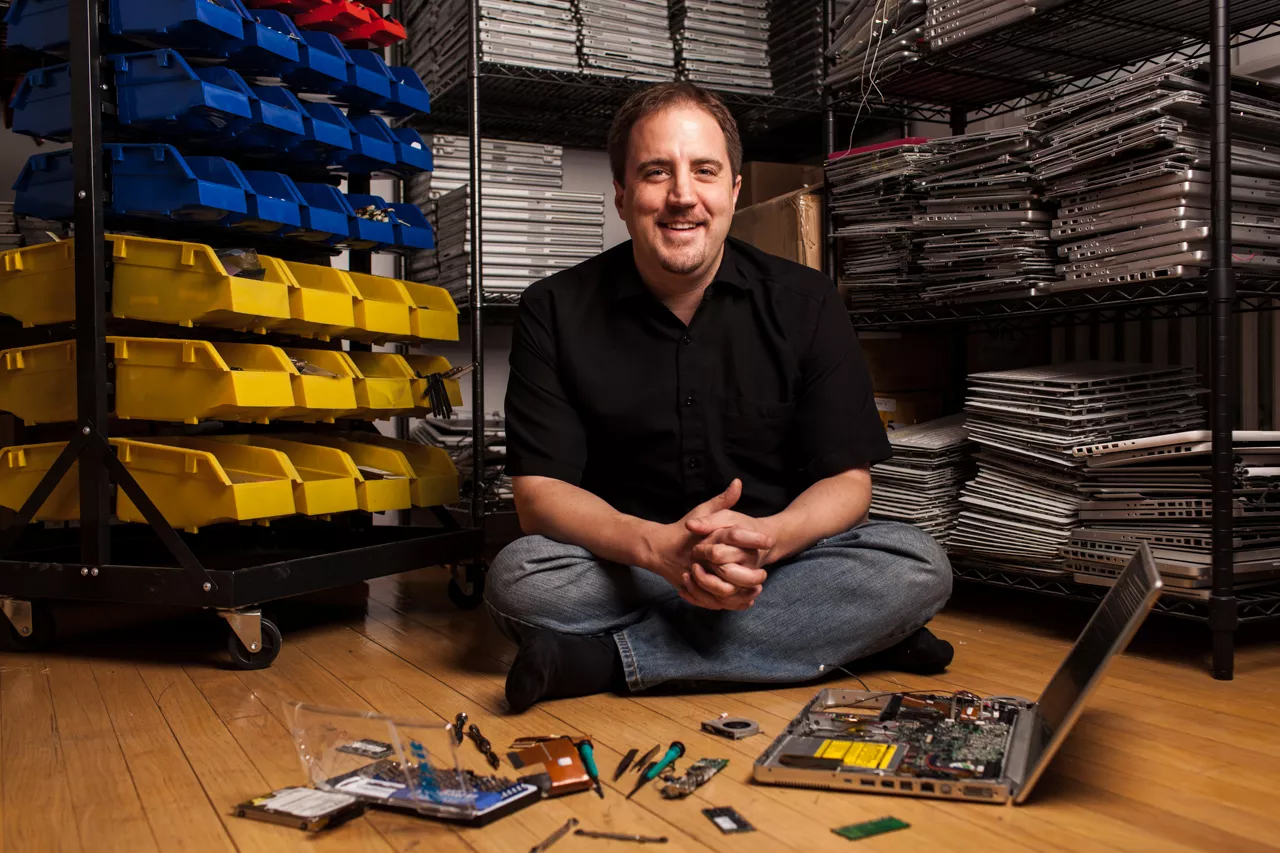
John bamsted
')
The same money will go from private repairmen, like Bamsted. For Apple, this is only a plus. The company in general, as is widely known, does not like its devices repaired, and ideally prefers to sell new ones every year. Even repairmen who work inside the Apple system constantly complain about tougher requirements and new sticks in the wheels. For example, to fix the latest MacBook Pro, they now need software purchased directly from Apple. The company's gadgets are known for poor maintainability, and Apple itself is actively fighting against the introduction of the law on "the right of consumers to repair."
For someone like John Bamsted, who is fixing gadgets from home, Apple’s requirements for obtaining the status of an official partner are too high. He says he does not have the necessary millions of dollars to replenish stocks in the warehouse every quarter. And about what needs to be done to become a member of the promised "sellers program", companies are still silent.
Amazon is literally half of all online sales. If you remove millions of absolutely good, albeit recently repaired, laptops from the platform, they seem to disappear. People no longer know what they are and what they can buy. As a result, these machines go for scrap, despite the fact that they are in excellent condition.
Many people want to buy inexpensive, refurbished laptops. And the world is full of craftsmen who want to repair and sell them. But the links connecting them are getting smaller.
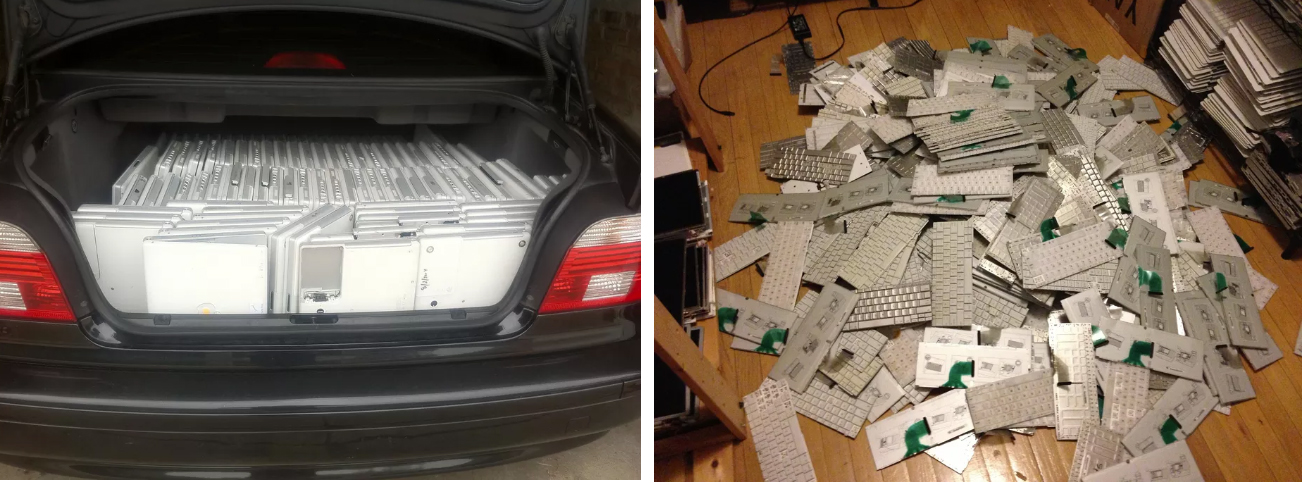
Business Bamsted
Amazon, of course, loses such sellers and such buyers of used gadgets. But for her it is not so critical. She still earns her billions. At this stage, her image is more important. Until recently, Apple itself did not sell products on their website, instead relying on Apple.com and several official resellers, like Best Buy. Now, as before Nike and other world-famous companies, it gets for itself a beautiful page . With all the gadgets in one convenient place, and without third parties. Apple can control these sales, and Amazon can tell its investors that they have now even attracted Apple.
Sucharit Kodali, Forrester's e-commerce analyst, explains:
Amazon needs brands. We know that consumers are following brands, they are looking for them. Since the beginning of the 2000s, third-party brands represented the site, and Amazon was happy with this. But now brands want to control their online image. They want to control how their product looks, especially on Amazon. For third parties in such conditions there is no space left.
Amazon also gains access to valuable information about how Apple’s online business operates. Kodali tells:
Bezos always said that he did not care who sells it, the manufacturer or the reseller. But companies are certainly more interesting than first-hand sales. So she can establish cooperation with these organizations, and learn about their margins. This is especially important given the development of their own line of Amazon Basics.
When you are an Apple and sell from Amazon, you share information about sales, about margins, about products that are sold, about the reasons for returns. You reveal many trade secrets. Therefore, for example, Apple prefers not to sell its smart HomePod column from Amazon. Information about it would be too valuable to develop Amazon Echo.
On questions that small repair shops are forced to leave the platform, a Amazon spokesman told The Verge that they can always try to qualify for Amazon Renewed . This section of the site is designed specifically for the sale of recovered goods. This section is open for Apple technology. However, Amazon itself will check your repair and sell your goods. She also works with reviews and controls every aspect of how products are presented on the site. From the seller and partner, you turn into a repairman.

John Bamstead is not the only one who has Amazon dealt and Apple has thrown out of the court. Thousands of sellers, both singles and rather large companies, are now forced to think what to do with the goods. CNet talked to an engineer from Colorado who sold Apple products for hundreds of thousands of dollars annually and is now looking for another job. AceBeach, which specialized in old and unique electronics, was forced to quit selling Apple hardware and focus on various toys. It seems that there are eBay and Walmart, which in no way restrict Apple sales, but these platforms cannot compete with Amazon in terms of popularity, and it’s too hard for a new retailer to find an audience there.
In the Facebook group where Bamstead communicates, dozens of former sellers in the past six months have teamed up to find a new home. They discuss alternative trading platforms, potential ways to protect their rights in court, and other strategies that could allow them to continue their business.
Through this group, Bamstead met Jim Ilardi, the founder of PiratePT Electronics , a small repair shop. Unlike John, who works in MacBooks, Ilardi found a niche in restoring old iPod Classic players. Apple no longer supports or sells these devices.
Ilardi gave the old iPods new cases and batteries, and then also began to change their hard drives to SSDs and increase disk space, so the products became even better than ever before. PiratePT had a 98% approval rating on Amazon, Ilardi was unique in its category. But in January he was also cleared. Now, almost nothing remains of his products for sale, and Ilardi is trying to find a new home on eBay and on Etsy . Plus, he earns repair of displays and various equipment that is sent to him.

New place of trade Ilardi
Hilardi says that his business, which used to bring solid income, is now going very badly. eBay does not show the user the sellers of the selected item. Instead, the buyer sees a list of bids. So Ilardi, with his "pumped-in" iPod Classic, has to compete with hundreds of ordinary old devices that the users themselves decided to sell. eBay doesn't give it away. The last hope is for Etsy, where, according to a repairman, he now gets a quarter of what he earned on Amazon.
The main question for these people, who suddenly lost their source of income, was how they prevented Apple and Amazon? Is a group of honest and independent online merchants such a threat to companies with revenues of $ 50 billion per quarter?
Apple sells MacBooks, and one could say that John Bamsted’s business is competing with it. But Bamsted deals with the products that have seen their summer, and people buy them from him, who never would have thought to spend $ 1000- $ 1500 on a new laptop. And so - at least they are accustomed to macOS ...
In Ilardi, the situation is even more clear:
I sell what they do not produce and support for a long time. My product - they got rid of it. What difference does Apple have now? They have been out of this business for five years.
And here, the new Apple-Amazon deal is directly confronted with the movement for the right to repair the purchased devices. Apple has been struggling for years against imposing such a right for consumers, spending hundreds of millions of dollars on it. Just last month, Apple's lobbyists pressured California lawmakers and prevented the adoption of such a law, saying that buyers could hurt themselves by trying to fix their iPhone on their own. So legal repair is still available only in Apple-authorized services.
The company is so worried about repairing its devices, because if the owners of its smartphones, tablets and computers find it convenient to repair them themselves, they will have less reason to buy new gadgets. And along with the right to repair goes the right to buy and sell refurbished devices.
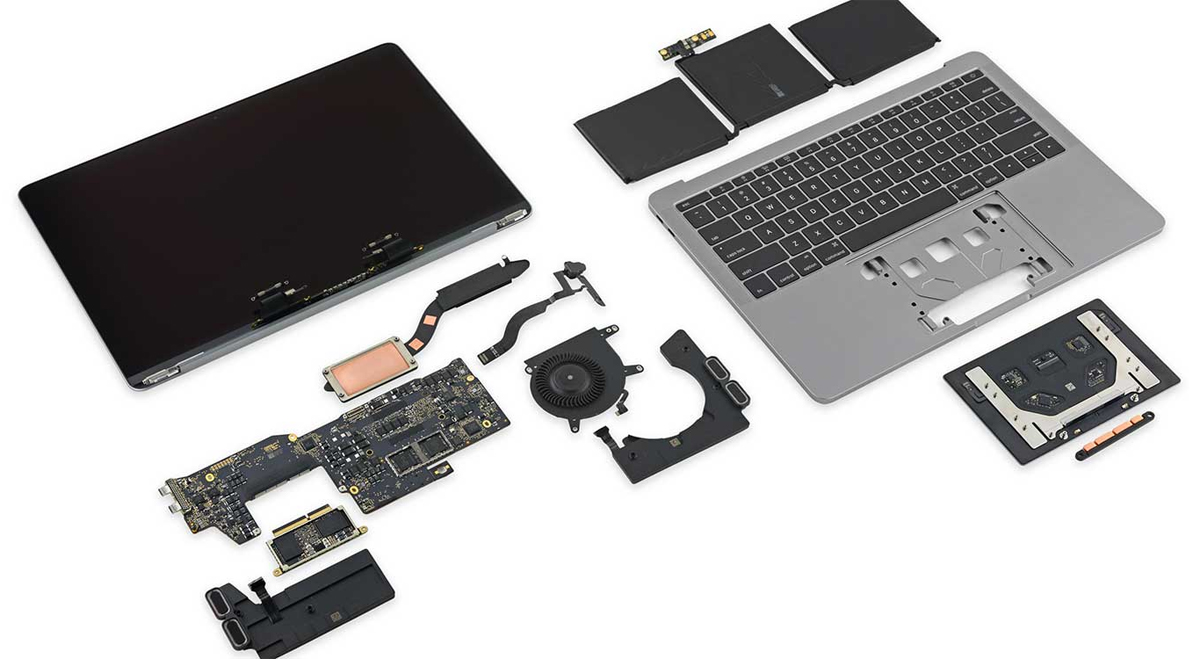
The US Supreme Court in 2013 ruled that users can sell products subject to copyright if they are legally owned. But this did not stop companies like Apple (and now Amazon) in their desire to make life difficult for such resellers. For example, in October, Apple confirmed that its new T2 chip installed in the MacBook Pro lineup and other computers completely blocks the device if it suddenly feels that some of its parts, like the motherboard, have been subjected to unauthorized repairs. The only way to avoid this is to buy a special diagnostic utility distributed by Apple among its partners. For small workshops, such as that of Bamstead, such a program is simply not available.
In the end, John says, the situation has become a science for him. "A lot of my friends were forced to leave the business." Bamstead instead returned to the wholesale sale of old MacBooks, which he worked on before opening his page on the Amazon Marketplace. He gets several dozens of laptops from recycling, repairs them, and gives them in batches of 10-20 pieces to vendors who usually have their own offline store or point of sale outside the States.
Bamstead also began to move most of his business to his personal website . And promote it through YouTube, showing how you can repair your MacBooks yourself. Sales are not nearly as much as they used to be with Amazon, but there are also advantages:
Someone is buying a laptop from my site, and I think - wow, it's that simple. Nobody needs to pay a part of the money, no deadlines, no need to be afraid that something suddenly changes in the infrastructure.
If I brought something out of all this, it is that, even if you are small, you still need your own platform. Then at least nobody will take it from you.
PS For the delivery of gadgets and any other goods from the US online stores there is Pochtoy.com. Saving a thousand rubles compared to shopping in Russian stores, and shipping costs start at $ 11.99. When registering with the code HABR you get a discount of 7%.
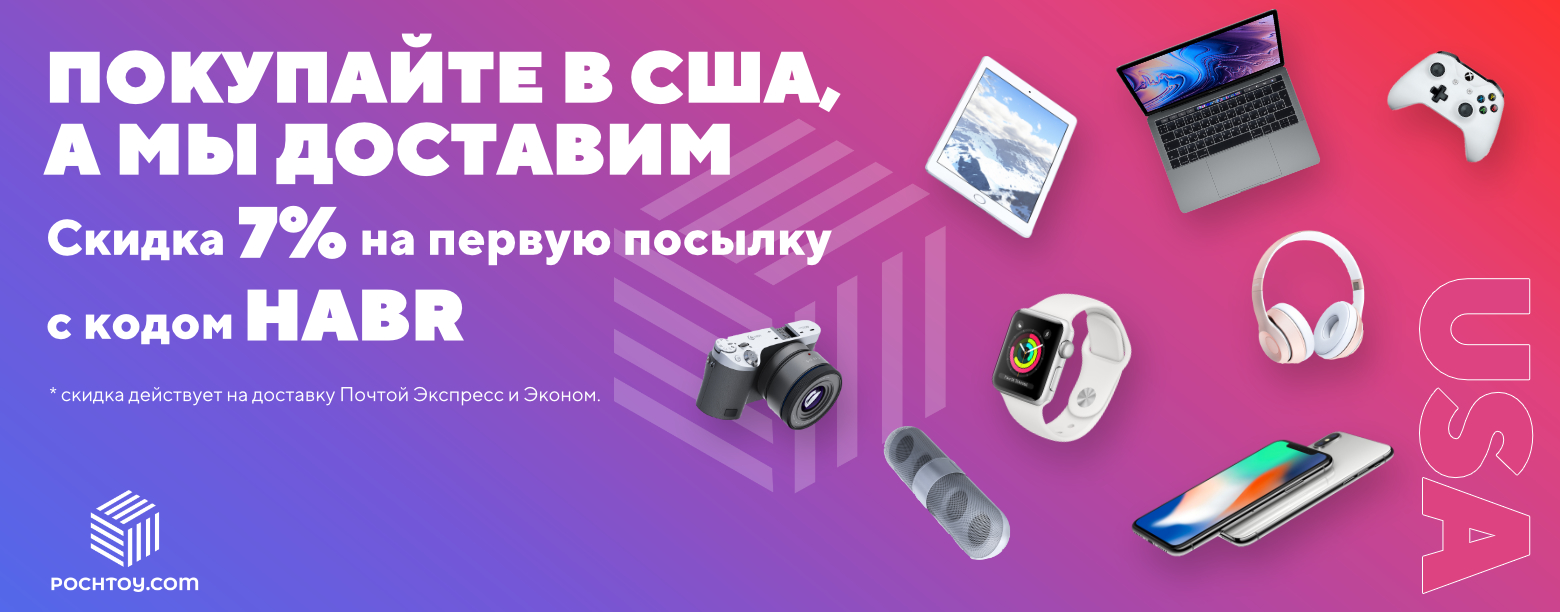
Source: https://habr.com/ru/post/454012/
All Articles